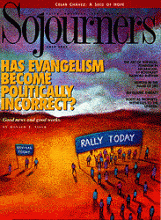In the aftermath of the World Trade Center bombing, considerable media attention has focused on militant Islam as an international phenomenon with domestic manifestations. The blind Egyptian religious leader, Sheikh Umar abd al-Rahman, has become the new symbol for this sinister face of Islam. Various political leaders and pundits now refer to the "Islamic threat."
Egyptian President Hosni Mubarak publicly underscored the dangers posed by Muslim militants in his first official visit to Washington during the Clinton administration; the issue is a pressing one in Egypt. Extremists associated with the Gamaa Islamiyya (Islamic Group) have targeted Coptic Orthodox churches, individual Christians, and several European tour groups this year.
Within days of Mubarak's visit, Israeli Prime Minister Yitzak Rabin arrived in Washington with similar warnings. In particular, Israeli officials blame HAMAS (the Islamic Resistance Movement) for multiple attacks on soldiers and civilians both in Israel and the Occupied Territories. Last December, the Rabin government abruptly deported more than 400 Gazans for alleged ties to HAMAS. The forced expulsion created an international controversy. Until May, it also created a massive obstacle to the resumption of Middle East peace talks.
Numerous other developments point to increased political activity by Islamic groups: the rapid growth of the Islamic Salvation Front and the brutal government suppression of that group during Algerian elections in 1992 (more than 12,000 were jailed this past year); the imposition of Islamic law in Sudan; the growing strength of the Muslim Brotherhood in Jordan where parliamentary elections are slated for 1993; ongoing revolutionary rhetoric by the Hizbollah (Party of God) in Lebanon and groups in Iran.
Read the Full Article

